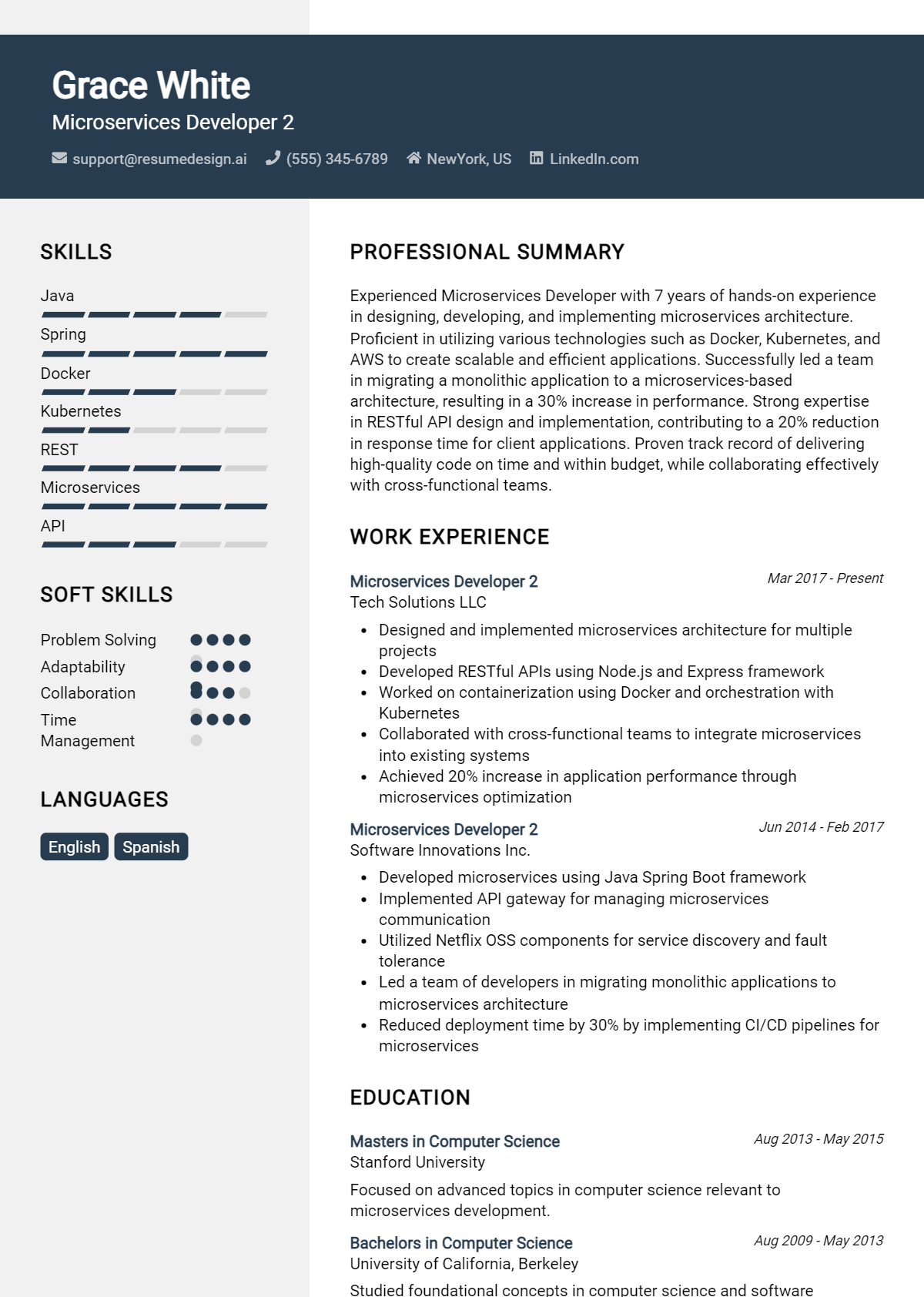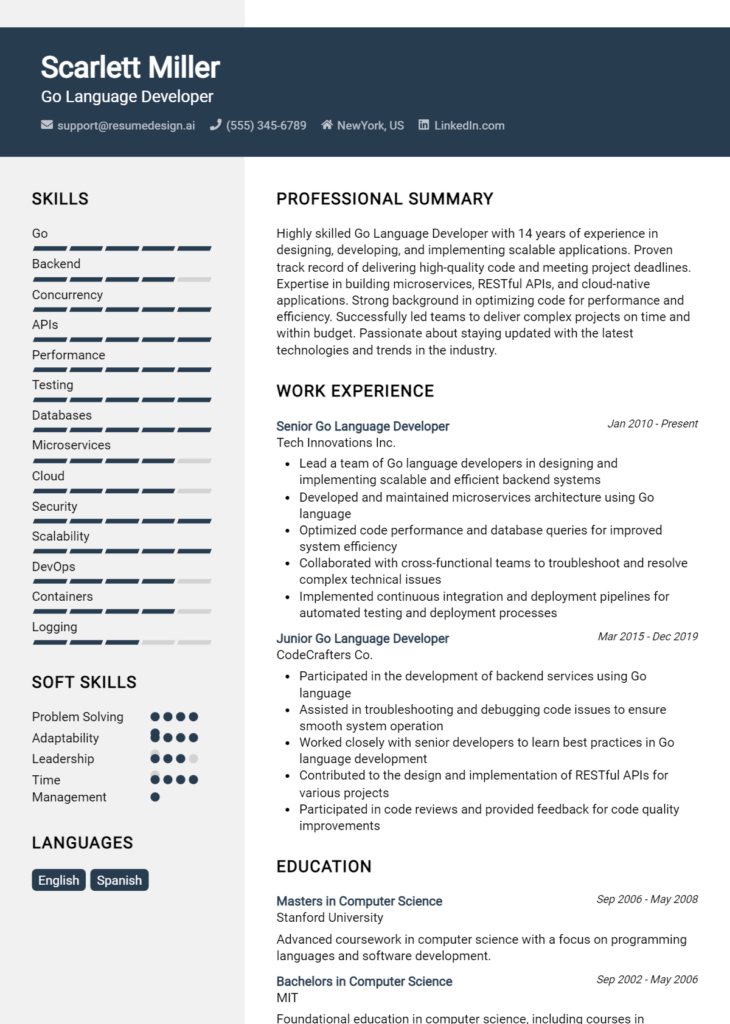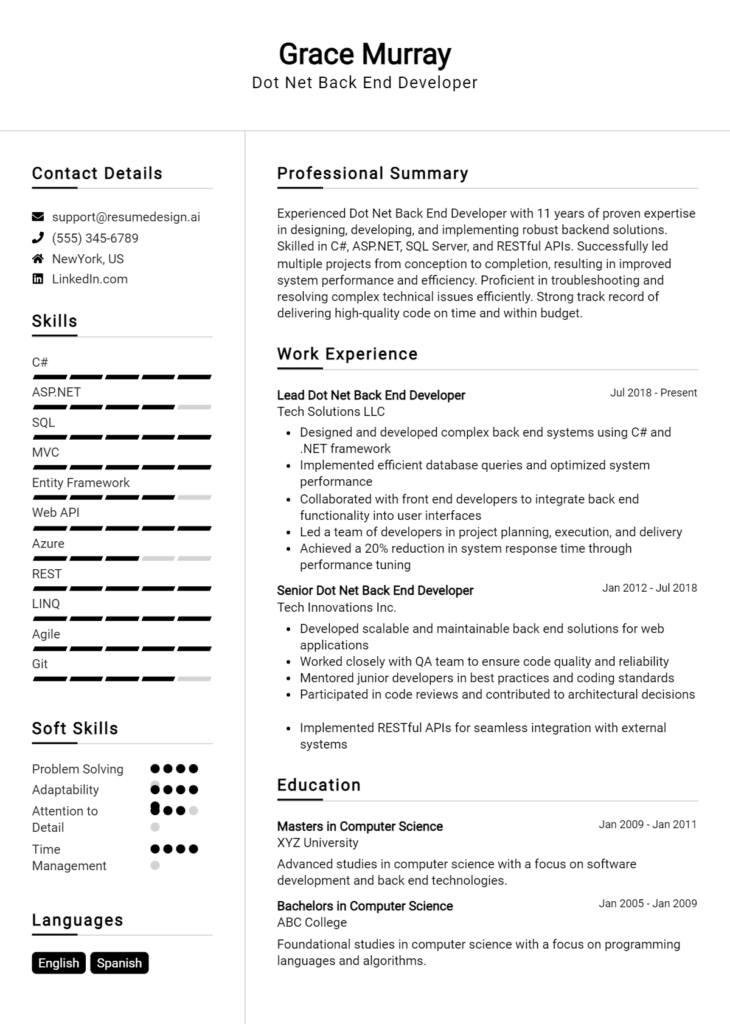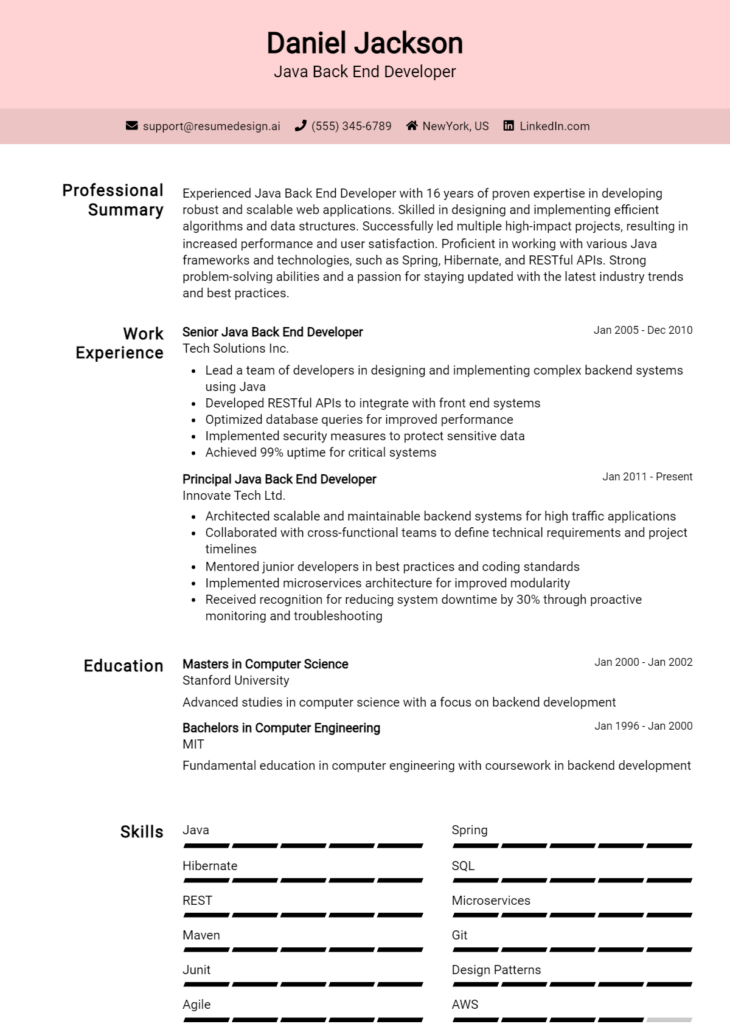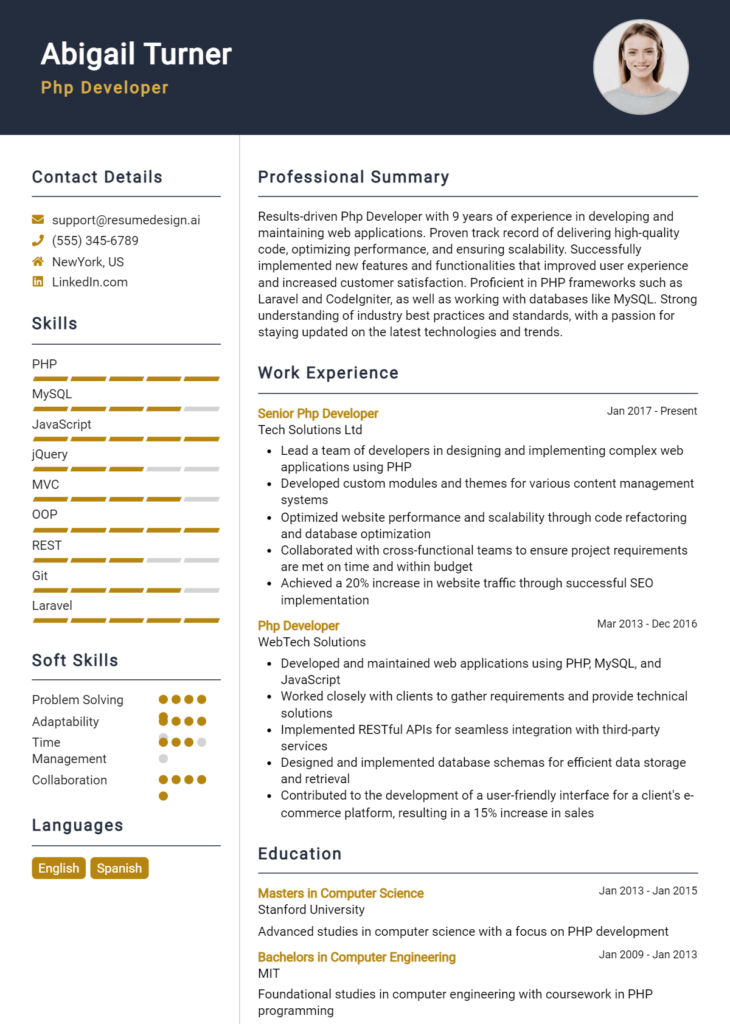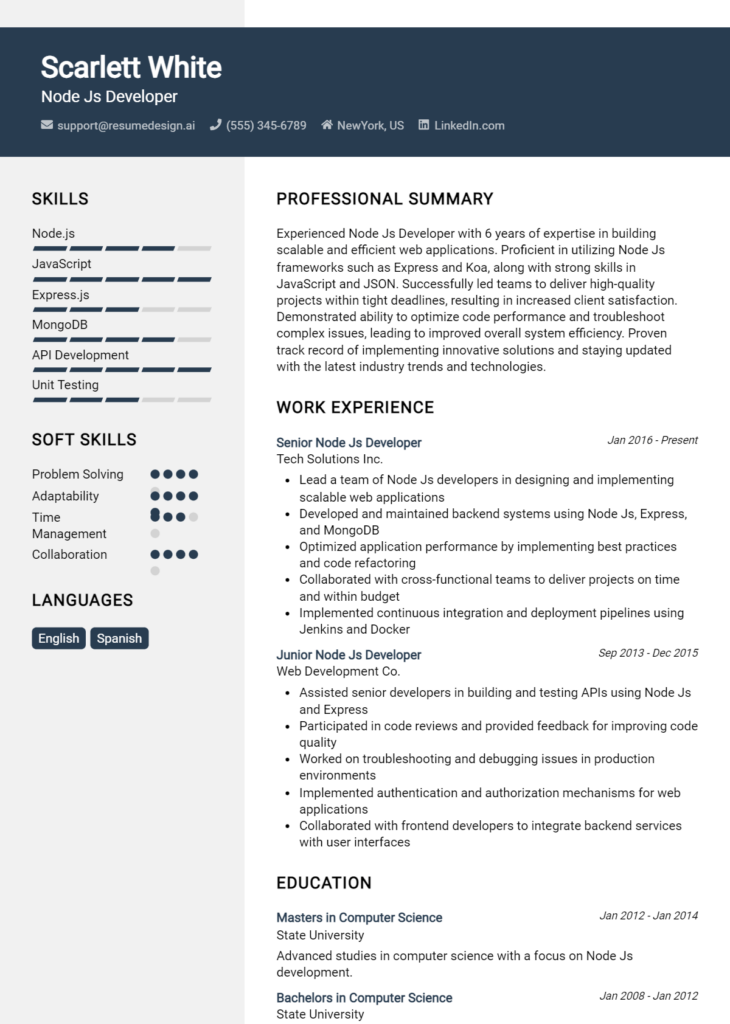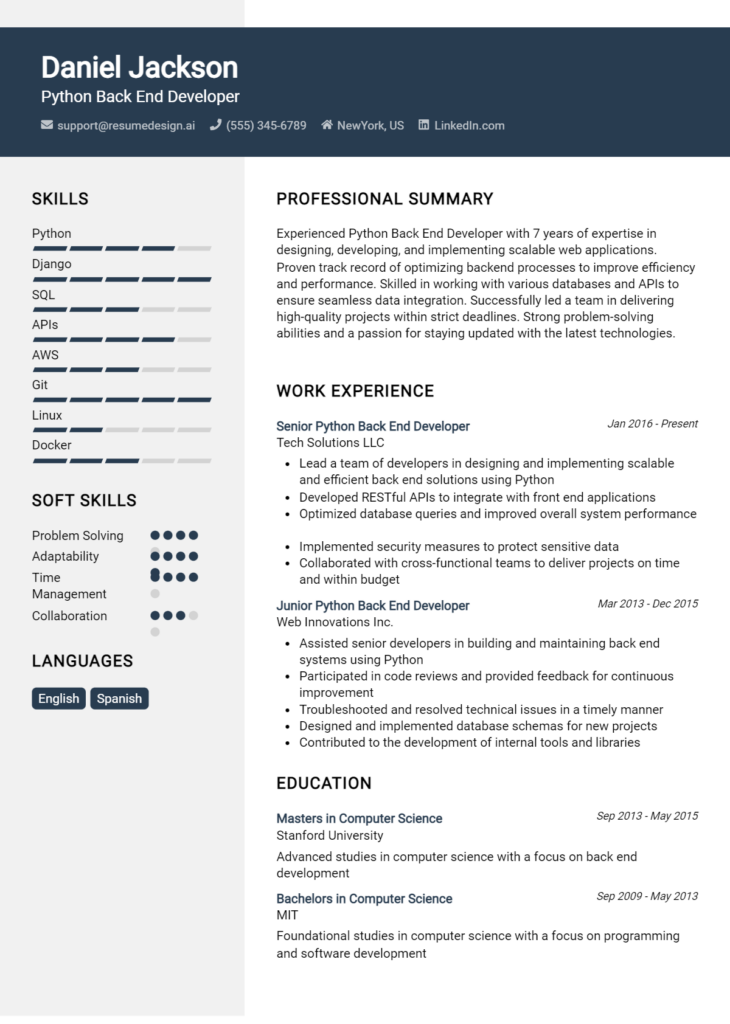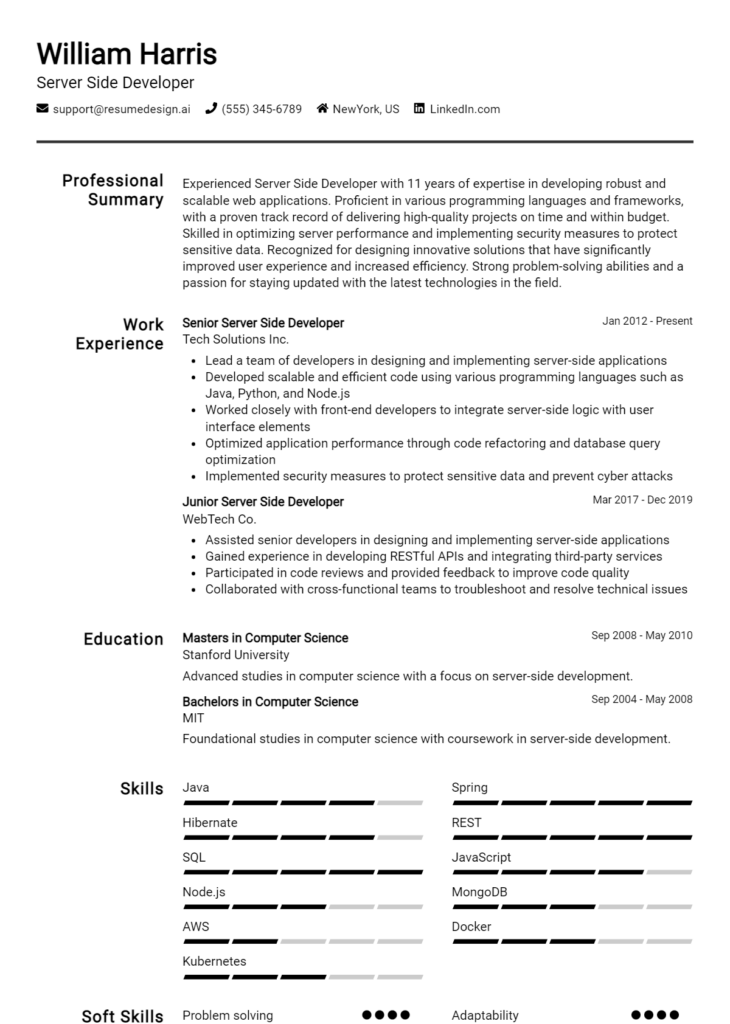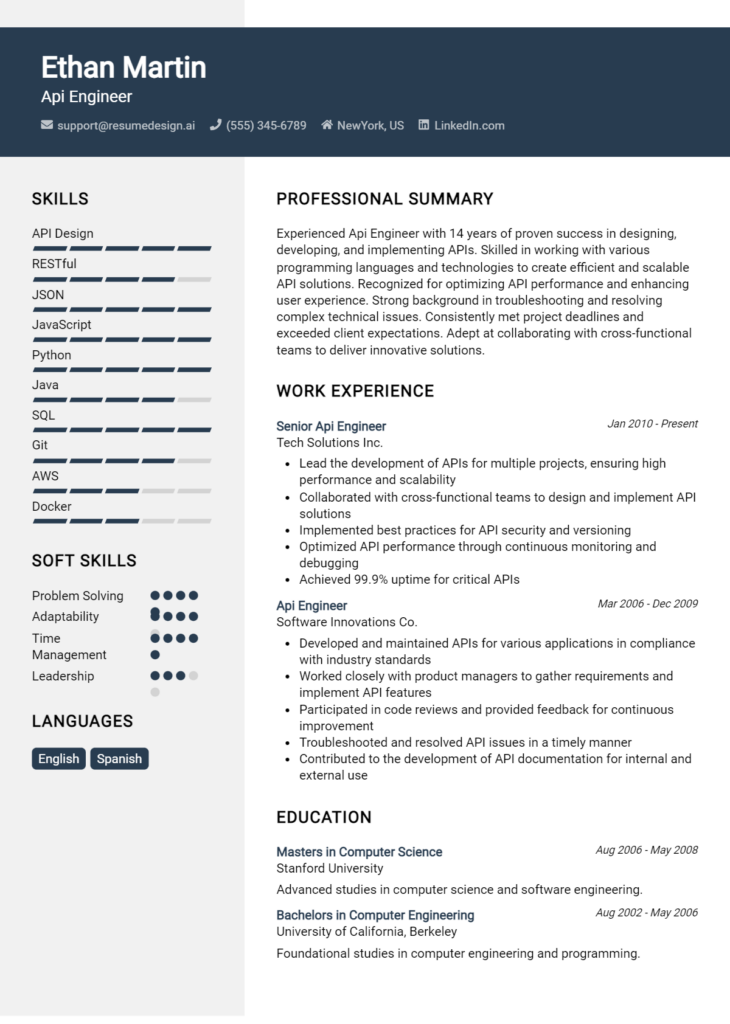Microservices Developer Core Responsibilities
A Microservices Developer is essential for creating scalable software applications by designing, developing, and maintaining microservices architecture. This role requires technical skills in programming languages, cloud technologies, and containerization, alongside operational expertise in DevOps practices. Problem-solving abilities are crucial for debugging and optimizing services. By collaborating across departments, Microservices Developers ensure that technical solutions align with organizational goals, making a well-structured resume vital for showcasing these qualifications and experiences effectively.
Common Responsibilities Listed on Microservices Developer Resume
- Designing and implementing microservices architecture.
- Developing, testing, and deploying microservices in cloud environments.
- Integrating third-party services and APIs.
- Collaborating with cross-functional teams to gather requirements.
- Monitoring and optimizing the performance of microservices.
- Implementing CI/CD pipelines for efficient deployment.
- Ensuring data consistency and integrity across services.
- Debugging and troubleshooting issues in production environments.
- Maintaining documentation for microservices and APIs.
- Participating in code reviews and providing constructive feedback.
- Staying updated with emerging technologies and best practices.
High-Level Resume Tips for Microservices Developer Professionals
In the competitive landscape of technology jobs, a well-crafted resume is essential for Microservices Developer professionals. As the first point of contact between a candidate and a potential employer, your resume must effectively showcase your technical skills, relevant experience, and notable achievements. It serves as a marketing tool that not only highlights your qualifications but also reflects your understanding of microservices architecture and best practices. This guide will provide practical and actionable resume tips specifically tailored for Microservices Developer professionals, ensuring you make a lasting impression.
Top Resume Tips for Microservices Developer Professionals
- Tailor your resume to each job description by incorporating relevant keywords and phrases from the posting.
- Highlight your experience with specific microservices frameworks and technologies, such as Docker, Kubernetes, Spring Boot, or Node.js.
- Showcase your ability to design and implement scalable microservices architectures, emphasizing any specific projects you've worked on.
- Quantify your achievements with metrics where possible, such as improved application performance or reduced deployment times.
- Include any experience with cloud platforms (AWS, Azure, Google Cloud) that are relevant to microservices deployment and management.
- Demonstrate your understanding of DevOps principles and practices, such as CI/CD pipelines, to highlight your holistic approach to software development.
- Provide examples of how you've collaborated with cross-functional teams to deliver complex software solutions successfully.
- List any certifications related to microservices, cloud computing, or relevant programming languages to enhance your credibility.
- Keep your resume concise and focused, ideally one to two pages, ensuring that each section adds value to your application.
- Utilize a clean and professional format that enhances readability, with clear headings and bullet points for easy navigation.
Implementing these tips can significantly increase your chances of landing a job in the Microservices Developer field. A well-optimized resume not only showcases your technical competencies but also demonstrates your ability to communicate effectively, making you a compelling candidate for potential employers.
Why Resume Headlines & Titles are Important for Microservices Developer
In the competitive landscape of software development, particularly in microservices, a well-crafted resume headline or title is crucial for a candidate's first impression. These elements serve as a snapshot of the applicant's qualifications, offering hiring managers an immediate insight into their suitability for the role. A strong headline can capture attention quickly, summarizing key skills and experiences in a concise, impactful manner. By directly reflecting the job being applied for, an effective resume headline not only sets the tone for the rest of the application but also demonstrates the candidate’s relevance and focus on the position.
Best Practices for Crafting Resume Headlines for Microservices Developer
- Keep it concise: Aim for a headline that is no longer than 10 words.
- Be role-specific: Tailor the headline to reflect the microservices developer position.
- Highlight key skills: Include technical skills that are vital for the role, such as "Java," "Docker," or "Kubernetes."
- Showcase relevant experience: Mention years of experience or specific accomplishments.
- Use action-oriented language: Employ strong verbs and active phrases to convey confidence.
- Avoid jargon: Ensure clarity by avoiding overly technical language that may confuse readers.
- Focus on impact: Consider including outcomes or benefits that result from your work.
- Regularly update: Refresh your headline as you gain new skills or shift career focuses.
Example Resume Headlines for Microservices Developer
Strong Resume Headlines
Innovative Microservices Developer with 5+ Years in Cloud Solutions
Skilled Java & Spring Boot Developer Specializing in Microservices Architecture
Results-Driven Microservices Engineer Experienced in Agile Methodologies
Lead Microservices Developer: Expert in Docker and Kubernetes Deployment
Weak Resume Headlines
Developer Looking for Job
Microservices Developer with Some Experience
The strong resume headlines are effective because they are specific, highlight key qualifications, and immediately communicate the candidate's value to potential employers. They utilize relevant keywords and emphasize experience, making them both attention-grabbing and informative. In contrast, the weak headlines fail to impress due to their vagueness and lack of detail, leaving hiring managers with no clear understanding of the candidate's capabilities or suitability for the role.
Writing an Exceptional Microservices Developer Resume Summary
A well-crafted resume summary is crucial for a Microservices Developer, as it serves as the first impression for hiring managers who sift through numerous applications. This succinct overview highlights the candidate's key skills, relevant experience, and notable accomplishments, providing a snapshot that can quickly capture attention. A strong resume summary is not only concise and impactful but also tailored to align with the specific job for which the candidate is applying, making it an essential component of an effective job application.
Best Practices for Writing a Microservices Developer Resume Summary
- Quantify achievements: Use specific numbers or metrics to demonstrate the impact of your work.
- Focus on relevant skills: Highlight technical skills that align with the job description, such as programming languages, frameworks, and tools.
- Tailor the summary: Customize the summary for each job application, incorporating keywords from the job description.
- Keep it concise: Aim for 3-5 sentences that summarize your experience without unnecessary detail.
- Showcase problem-solving abilities: Mention specific challenges you've faced and how you overcame them.
- Emphasize collaboration: Highlight experience working within teams, especially in agile environments.
- Include certifications: Mention relevant certifications that bolster your qualifications.
- Use action verbs: Start sentences with strong action verbs to convey a sense of dynamism and impact.
Example Microservices Developer Resume Summaries
Strong Resume Summaries
Results-driven Microservices Developer with over 5 years of experience in designing and implementing scalable architectures. Successfully migrated a monolithic application to microservices, reducing load times by 40% and improving overall system efficiency. Proficient in Java, Spring Boot, and Docker, with a strong focus on cloud-native applications.
Innovative Microservices Developer with expertise in RESTful API design and microservices architecture, having led a team to develop a highly available e-commerce platform that increased sales by 30% in the first quarter post-launch. Skilled in Kubernetes, AWS, and CI/CD pipelines.
Dedicated Microservices Developer with 7+ years of experience in delivering robust solutions in fast-paced environments. Spearheaded the development of a microservices framework that reduced deployment time by 50% and enhanced system reliability. Strong experience with Python, Node.js, and event-driven architecture.
Weak Resume Summaries
Microservices Developer with some experience in software development and a background in coding. Looking for a new opportunity to apply skills.
I am a software developer interested in microservices and want to expand my knowledge. I have worked on various projects.
The examples of strong resume summaries are effective because they are specific, quantifiable, and directly aligned with the skills and experiences relevant to a Microservices Developer role. They provide concrete examples of achievements and technical competencies, making them compelling to hiring managers. In contrast, the weak summaries lack detail and clarity, failing to highlight specific accomplishments or skills, which makes them less impactful and memorable.
Work Experience Section for Microservices Developer Resume
The work experience section of a Microservices Developer resume is vital as it serves as a testament to the candidate's technical skills and practical application of microservices architecture. This section not only highlights the specific technologies and frameworks the candidate has worked with but also demonstrates their ability to manage teams, collaborate across departments, and deliver high-quality products on time. By quantifying achievements and aligning experiences with industry standards, candidates can effectively showcase their success and readiness for future challenges in microservices development.
Best Practices for Microservices Developer Work Experience
- Highlight specific technologies and frameworks used (e.g., Spring Boot, Docker, Kubernetes).
- Quantify achievements with metrics (e.g., reduced deployment time by 30%, improved application performance by 25%).
- Emphasize collaborative projects that involved cross-functional teams.
- Showcase leadership roles in implementing microservices architectures.
- Detail the impact of your contributions on project outcomes and business goals.
- Use action verbs to describe responsibilities and achievements (e.g., "developed," "optimized," "led").
- Tailor the experience to align with the job description and industry standards.
- Include relevant certifications or training that reinforce your expertise in microservices.
Example Work Experiences for Microservices Developer
Strong Experiences
- Led a team of 5 developers in the successful migration of a monolithic application to a microservices architecture, resulting in a 40% reduction in system downtime.
- Designed and implemented a microservices-based solution for an e-commerce platform, increasing transaction processing speed by 50% and enhancing user satisfaction ratings.
- Collaborated with DevOps teams to automate CI/CD pipelines, reducing deployment time by 60% and improving overall software quality.
- Developed microservices using Spring Boot and Docker, achieving a 30% improvement in resource utilization across cloud infrastructure.
Weak Experiences
- Worked on various projects involving microservices.
- Participated in meetings and discussions about software development.
- Helped with some coding tasks for a microservices application.
- Contributed to team efforts on software-related tasks.
The examples provided illustrate the distinction between strong and weak experiences in a Microservices Developer resume. Strong experiences are specific, quantifiable, and demonstrate leadership, collaboration, and significant contributions to projects, making them impactful and relevant. In contrast, weak experiences lack detail, specificity, and measurable outcomes, which fail to convey the candidate's skills and effectiveness in a competitive job market.
Education and Certifications Section for Microservices Developer Resume
The education and certifications section of a Microservices Developer resume is crucial as it serves to showcase the candidate's academic background and any industry-relevant credentials that emphasize their expertise in the field. This section not only highlights formal education but also underscores ongoing professional development through certifications and specialized training. By providing relevant coursework, certifications, and training, candidates can significantly enhance their credibility and demonstrate a commitment to continuous learning, which is essential in the rapidly evolving landscape of microservices architecture and development.
Best Practices for Microservices Developer Education and Certifications
- Prioritize relevant educational qualifications related to software development, computer science, or information technology.
- Include industry-recognized certifications, such as those from AWS, Azure, or Google Cloud, that validate your expertise in cloud services and microservices.
- Highlight any specialized training in microservices architecture, containerization (e.g., Docker, Kubernetes), or API development.
- Detail relevant coursework from your degree that directly pertains to microservices, such as distributed systems or software engineering.
- Showcase any hands-on projects or case studies completed during your educational journey that demonstrate practical skills.
- Keep the section concise while ensuring it remains comprehensive enough to illustrate your qualifications effectively.
- Regularly update this section to reflect new certifications or courses that align with industry advancements.
- Consider the inclusion of online courses or bootcamps that focus on microservices and related technologies.
Example Education and Certifications for Microservices Developer
Strong Examples
- Bachelor of Science in Computer Science, University of Technology, 2020
- AWS Certified Solutions Architect – Associate, 2023
- Google Cloud Professional Cloud Developer, 2022
- Specialized Course in Microservices Architecture, Coursera, 2021
Weak Examples
- Associate Degree in Graphic Design, Community College, 2018
- Certified Microsoft Office Specialist, 2019
- High School Diploma, 2017
- Outdated Java SE 7 Programmer Certification, 2016
The examples labeled as strong are considered effective because they align directly with the skills and knowledge required for a Microservices Developer, showcasing both relevant degrees and recognized certifications that validate technical expertise. Conversely, the weak examples lack relevance to the role, either because they pertain to unrelated fields or are outdated certifications that no longer reflect current industry standards. This distinction is essential for ensuring that the candidate stands out in a competitive job market.
Top Skills & Keywords for Microservices Developer Resume
As a Microservices Developer, showcasing the right skills in your resume is crucial to stand out in a competitive job market. Employers look for candidates who not only possess technical expertise but also exhibit strong interpersonal abilities that contribute to team dynamics and project success. A well-rounded skill set can highlight your proficiency in designing, developing, and deploying microservices, while also demonstrating your capability to collaborate effectively with cross-functional teams. Therefore, curating a list of both hard and soft skills tailored specifically for a Microservices Developer role can significantly enhance your resume and attract the attention of hiring managers.
Top Hard & Soft Skills for Microservices Developer
Soft Skills
- Effective communication
- Problem-solving abilities
- Team collaboration
- Adaptability and flexibility
- Critical thinking
- Time management
- Attention to detail
- Creativity and innovation
- Conflict resolution
- Leadership potential
Hard Skills
- Proficiency in programming languages (Java, Python, Go)
- Experience with containerization technologies (Docker, Kubernetes)
- Knowledge of RESTful APIs and microservices architecture
- Familiarity with cloud platforms (AWS, Azure, Google Cloud)
- Understanding of CI/CD pipelines and DevOps practices
- Experience with database technologies (SQL, NoSQL)
- Proficiency in Agile methodologies
- Knowledge of service mesh technologies (Istio, Linkerd)
- Experience with monitoring and logging tools (Prometheus, ELK Stack)
- Understanding of security best practices in microservices
For a more detailed exploration of essential skills and how to effectively outline your work experience, consider integrating these aspects into your resume to present a comprehensive picture of your qualifications.
Stand Out with a Winning Microservices Developer Cover Letter
Dear Hiring Manager,
I am excited to apply for the Microservices Developer position at [Company Name], as advertised on [Job Board/Company Website]. With a strong background in software development and a passion for building scalable and efficient microservices architectures, I am confident in my ability to contribute effectively to your team. My hands-on experience with technologies such as Docker, Kubernetes, and Spring Boot, combined with my knowledge of RESTful APIs and cloud services, positions me well to support [Company Name] in achieving its development goals.
In my previous role at [Previous Company Name], I successfully led a project that transitioned a monolithic application to a microservices architecture, resulting in improved system performance and reduced deployment times by over 30%. I collaborated closely with cross-functional teams, utilizing Agile methodologies to ensure timely delivery and high-quality code. My focus on continuous integration and continuous deployment (CI/CD) practices fostered a culture of collaboration and rapid iteration, which significantly enhanced our development workflow.
I am particularly drawn to [Company Name] because of your commitment to innovation and your focus on leveraging cutting-edge technologies to solve complex problems. I am eager to bring my expertise in microservices development to your team, ensuring that we create robust, maintainable, and scalable systems that align with business objectives. I am excited about the opportunity to collaborate with like-minded professionals who share my passion for developing high-quality software solutions.
Thank you for considering my application. I look forward to the opportunity to discuss how my skills and experiences align with the needs of your team at [Company Name]. I am eager to contribute to your projects and be a part of an organization that values creativity and technical excellence.
Sincerely,
[Your Name]
[Your Phone Number]
[Your Email Address]
Common Mistakes to Avoid in a Microservices Developer Resume
When crafting a resume for a Microservices Developer position, it's crucial to highlight your technical skills and experience effectively. However, many candidates make common mistakes that can hinder their chances of landing an interview. Avoiding these pitfalls not only improves the clarity of your resume but also enhances your overall professional image. Here are some common mistakes to steer clear of:
Vague Job Descriptions: Failing to provide specific details about your previous roles can make it hard for hiring managers to understand your contributions and expertise. Always include quantifiable achievements and responsibilities.
Ignoring Relevant Skills: Microservices development requires specific technical skills like Docker, Kubernetes, or API design. Neglecting to list these relevant skills can cause your resume to be overlooked.
Overloading with Jargon: While technical terminology is important, overusing jargon can alienate readers. Strike a balance by ensuring your resume is accessible to both technical and non-technical reviewers.
Lack of Tailoring: Sending out the same resume for different applications can be detrimental. Tailor your resume to each job by aligning your experience with the specific requirements of the position.
Neglecting Soft Skills: While technical skills are crucial, soft skills like teamwork, communication, and problem-solving are equally important in a microservices environment. Don’t forget to highlight these attributes.
Not Showcasing Project Experience: Microservices development often involves working on numerous projects. Failing to include these projects, along with your role and technologies used, can weaken your resume.
Skipping Continuous Learning: The tech field is ever-evolving. Not mentioning any certifications, courses, or learning initiatives can suggest a lack of commitment to staying updated in your field.
Inconsistent Formatting: A resume with inconsistent formatting can distract from the content. Ensure uniformity in font, style, and layout to present a professional appearance.
Conclusion
As a Microservices Developer, your role is pivotal in designing and implementing scalable and efficient services that form the backbone of modern applications. In this article, we've explored the essential skills and technologies that define a successful Microservices Developer, including proficiency in programming languages like Java, Python, or Go, experience with containerization tools such as Docker and Kubernetes, and a solid understanding of APIs and cloud platforms.
We also discussed the importance of maintaining a robust architecture, utilizing best practices for microservices design, and ensuring seamless communication between services. Additionally, we highlighted the significance of continuous integration and deployment (CI/CD) in streamlining development processes and improving service reliability.
In conclusion, as the demand for skilled Microservices Developers continues to grow, it's crucial to ensure that your resume effectively showcases your expertise and experience in this field. Take a moment to review your Microservices Developer Resume and consider utilizing available resources to enhance it. Tools like resume templates, resume builder, resume examples, and cover letter templates can provide valuable assistance in crafting a standout application. Don’t miss the opportunity to present your skills in the best light possible!

